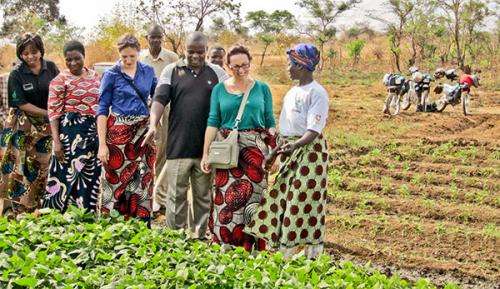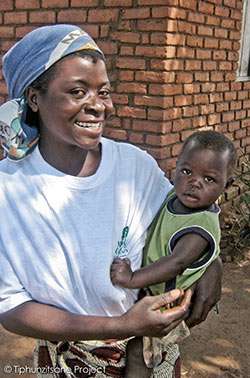Attacking HIV/AIDS with economic change

Poverty and disease are a deadly combination.
But a team led by UWM scientists is proving that in one small corner of the world programs that combine public health and microeconomics can lead to change.
The country is Malawi, where 65 percent of the population lives in poverty and HIV infects 11 percent of adults.
The UWM research team, led by Lance Weinhardt, professor of community and behavioral health promotion in the Joseph J. Zilber School of Public Health, and Loren Galvao, a senior scientist in the College of Nursing Center for Global Health Equity, is studying how a combined food security program that includes microfinance groups and sustainable agriculture training can impact public health.
Sage research leads to results
The SAGE4Health Project involves CARE international, CARE Malawi, local field scientists and researchers from the London School of Economics and Political Science, the Medical College of Wisconsin and the University of Pennsylvania. The project, originally known as Tiphunzitsane or "working together" in the Chichewa language, was recently renamed to reflect key goals: Savings, Agriculture, Governance and Empowerment.
More than 2,000 Malawian households are involved in the five-year study, funded through the Eunice Kennedy Shriver National Institute of Child Health & Human Development, part of the National Institutes of Health.
Preliminary results, presented recently at the International AIDS Conference and the American Public Health Association national conference, are encouraging, according to Galvao and Weinhardt. Those results, based on the first 18 months of findings in the five-year project, are summarized below.
The food security program significantly decreased the number of households that had insufficient food at any time in the previous year.
The use of sustainable agricultural practices was strongly associated with an increase in food security and improvement in a household's economic well being.
Microfinance in the form of Village Savings and Loans was having a positive impact on the health of mothers, who often used loans to travel for prenatal care and to a hospital to deliver their babies.
More women were traveling to clinics and other facilities rather than giving birth at home, though other factors than the CARE programs may affect those trends.

Significant increases in self-reported testing for HIV among women involved in the food security program may be linked to the improvements in food security and economic well-being.
"We are doing something about these seemingly intractable problems," says Weinhardt. "We're figuring out what works."
The credit, he is quick to add, is due to the multinational, multidisciplinary nature of the effort. (In addition to Galvao and Weinhardt, other UWM researchers involved include Patricia Stevens and Lucy Mkandawire-Valhmu of the College of Nursing and Alice Yan and Emannuel Ngui of the Joseph J. Zilber School of Public Health).
"Poverty is related to HIV and other health outcomes," says Weinhardt. "It's a fundamental cause of ill health. We can wave our hands and say we can't do anything, or we can try to understand the relationships and try to do something about it."
Disease kills, agriculture sustains
In Malawi and other impoverished countries, people who aren't able to afford a healthy diet are more susceptible to diseases like HIV/AIDS. And, in a country where 85 percent of the people live in rural areas and depend on subsistence farming with hand tools, the loss of workers to illness can result in a devastating financial loss to any family. All these problems, in turn, can lead to risky health behaviors.
The UWM researchers and their partners are looking at the impact of a program that consists of four specific CARE-delivered elements: farmer field schools, village savings and loans, group HIV/AIDS and gender empowerment education, and strengthening community governance.
One area the researchers looked at, for example, was food security – measured simply by months in which a family had enough food to eat. Because farmers in the area had relied on a single crop – corn – for both food and income, they were vulnerable to increasingly unstable weather cycles. A drought in 2006 had devastated the economy.
Through the farmer field schools, the CARE partners helped farmers diversify their crops, plant drought-resistant varieties of seeds and use a variety of sustainable agriculture techniques.
In the first 18 months of the project, the researchers found a significant decrease in food insecurity in the areas where CARE had made efforts to improve farming practices and develop village savings and loans, compared to areas that did not receive the program. Before these efforts started, 71 percent of people in the area had experienced food insecurity. After the first 18 months of the project, only 45 percent had experienced it. Food insecurity also decreased in a control area, but not by nearly as much.
Savings, loans, labor
The village savings and loan groups, which pooled villagers' resources to make small loans to each other, have positively impacted not only the local economy, but also maternal health. As one woman explained:
"When you are pregnant, you get the loan in advance and when labor begins, you can hire a vehicle or a bicycle to take you to the hospital."
With Malawi's high maternal and infant mortality rates, small loans for prenatal care and hospital delivery can have an immediate impact, says Galvao.
The researchers also have gathered and presented preliminary information on other health-related issues, such as attitudes toward male circumcision (circumcision is a factor in AIDS/HIV prevention), maternal and infant health and self-reported HIV/AIDS testing.
The focus of their continuing efforts, says Galvao, is evaluating such sustainable economic development projects and providing the scientific evidence about what works so that it can be shared with other areas of Malawi, Africa and the world.
"There are many partnerships and NGOs (nongovernmental organizations like CARE) working on these issues, but there are not many studies that evaluate the interventions over the long term to see what works."
To learn more about the work in Malawi and its economic impact, watch the "International Focus" show, hosted by Rob Ricigliano of the Center for International Education, featuring Galvao, Weinhardt and Lucy Mkandwire-Valhmu.
















